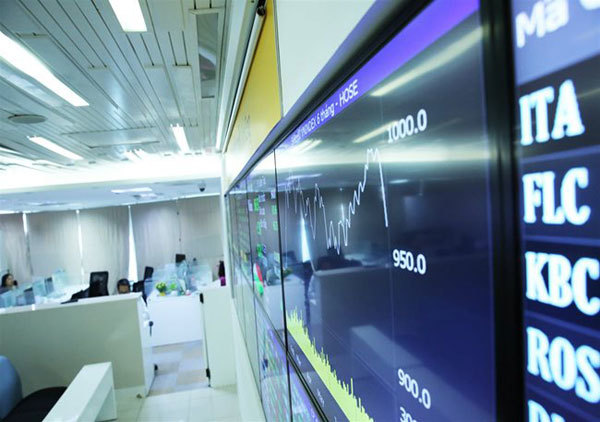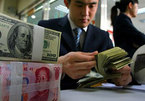 |
| It must be admitted that the greater penetration of the group of foreign securities companies has made the competition increasingly fierce among firms across the industry – Photo: Thanh Hoa |
In its October update on Vietnam’s economic developments, the World Bank (WB) said the country’s credit growth continued to stay low in September at only 10.2% year-on-year, significantly lower than the average growth rate of 16.2% in the previous five years. Banks were hesitant to extend credit as the demand for loans among the business community slowed down and risks were higher during the economic downturn, even though the State Bank of Vietnam (SBV) relaxed the conditions for loans in recent months, according to the WB.
In the context of a disrupted supply chain, uncertain markets and stagnant consumer demand, quite a few companies with access to bank capital were not so keen on taking out a loan, while a number of others were not even eligible to borrow in the current situation. Consequently, although the lending rates for the preferred sectors have gone down to 4.5% per year, the real capital flows into production activities have not been able to flourish.
However, drastically declining interest rates over time has prompted money to run into investment channels, not only the idle cash flow but also the sources of capital for loans in the economy. As per the recent financial statements of securities companies, the total outstanding loans, mainly margin loans, on the market as of the end of the third quarter had amounted to some VND66 trillion, a record number for the stock market of Vietnam since its establishment.
Apparently, this cash flow from margin lending not only contributes to a more balanced supply amid the dominant trend of net selling by foreign investors, but also helps the market maintain a positive uptrend after hitting rock bottom in late March. By the end of the third quarter, the 20 largest securities companies had registered a margin lending balance of more than VND57.6 trillion, a rise of 33% from the end of the first quarter and 19% from the second quarter of 2020.
Securities companies in a race
First, it must be admitted that the greater penetration of the group of foreign securities companies has made the competition increasingly fierce among firms across the industry. These movers and shakers, mostly from South Korea, whose major financial resources are from their parent groups, are given access to low-interest loans abroad, especially in the current downpour of cheap money. As a result, margin lending has become an important battleground where the industry players fight for customers.
Therefore, margin rates offered by securities firms have been in a consistent downward trend since the beginning of the year, as foreigners have consecutively launched loan packages with preferential interest rates to entice investors into opening an account.
Which is why it comes as no surprise that foreign securities firms are holding an increasingly significant share of the margin lending market. For example, in Q3, three foreign securities companies appeared in the top 10 in terms of outstanding loans, all of which are Korean, namely Mirae Asset, KIS and KB Securities. In particular, Mirae Asset once again secured their No. 1 position when it comes to outstanding loans with the growth of 13% in the third quarter, to VND9.67 trillion, which is also a new record for the stock market of Vietnam.
Meanwhile, Pinetree Securities, after being acquired by Hanwa in late 2019, has drummed up much attention as the first securities company to adopt a free lifetime transaction policy, in addition to the launch of a margin loan package with an annual interest rate of only 6.8% for two months. The report also shows the company’s outstanding loans by the end of the third quarter had further grown strongly by 59% over the preceding quarter, reaching VND251 billion, making Pinetree the securities company with the highest outstanding loan growth in the market.
The fact that foreign stock brokerage houses are not hesitant to sharply cut their margin rates makes their domestic rivals find it hard to sit still. This October, VCBS, SSI, Viet Capital, FPTS, PHS, among others, joined the race to bring down interest rates, with market leader SSI as a notable case when their rates were considerably reduced from 14% to 11.8% per annum. However, the interest rates of around 12% offered by these companies are just equal to the average level of the market at present. Some securities firms are offering a relatively low margin lending rate of only 9-10% a year, such as Pinetree, AIS, VPS or TVSI. This is equivalent to the lending interest rates banks charge their common customers.
Abundant capital
Notably, while many stock brokerage houses suffered limited financial resources last year as their parent banks had to refrain themselves to meet the inspection requirements from the authorities, they are allocated the normal quota this year. Furthermore, their financial resources have been more and more abundant since the beginning of the year as the parent banks also see their markets stagnate, whereas the constantly falling deposit rates help sharply reduce capital expenditures. Take VPS, a subsidiary of VPBank as an example, which earlier this October launched a credit program with the lowest interest rate in the market today—6.8% per annum for all customers opening new accounts at VPS.
What’s more, while foreign securities companies keep hiking their capital to enhance their competitiveness in margin lending, domestic firms have taken the initiative to reinforce their business capital sources through bond issuance. Statistics from the HNX show that securities companies have issued bonds worth more than VND4.4 trillion in the first nine months of 2020.
In addition, the Q3 financial statements of stock brokerage houses reveal a substantial increase in deposits by customers, suggesting that a major amount of capital is waiting for opportunities to flow in following a market correction. Specifically, many of the top 20 securities companies with the greatest margin lending balance also recorded impressive growth of more than 100% in their customer deposits, such as VPS, VCBS or SSI.
Basically, investors’ deposits in securities firms are usually from individual investors. Although these deposits enjoy very low demand interest rates, many investors still keep them in their accounts at securities companies, to be able to take them out at any time when there are ideal opportunities.
Apparently, in addition to dropping interest rates when financial resources at securities firms are plentiful, the strong growth of the stock market over the past seven months has also stimulated investors’ loans. In turn, margin loans has become an important driving force that boosted the market’s uptrend. Yet this also means the risk of correction is building up as the margin lending balance becomes increasingly tense.
That said, with the considerable amount of money from investors on the wait, securities companies still have fairly ample financial resources to grant more loans. This coupled with the fact that bank capital is struggling to find borrowers plus more deposits coming has raised hope of a minor market correction, when a massive cash flow is still waiting to find its way in. SGT
Ho Le

Real estate stocks await cash flow
Domestic and foreign capital flow is expected to bolster real estate shares after the COVID-19 pandemic as many investors are paying attention to the industry.

Strong cash flow as investors remain optimistic about Vietnam’s Covid-19 management
Vietnam’s stocks have seen a strong rise in the context of strong capital flow, successful pandemic control, and businesses’ adaptation to the new conditions.